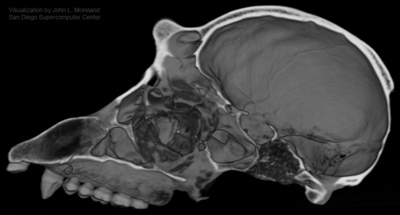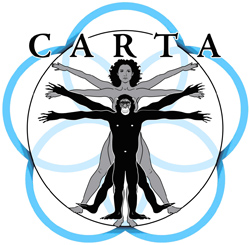CARTA to Digitize Extensive Primate Collection This Summer
San Diego, June 16, 2009 -- To help trace the origins of the human species, and potential links to other primates, researchers with the Center for Academic Research and Training in Anthropogeny (CARTA) -- a joint organized research unit of the University of California, San Diego and the Salk Institute for Biological Studies -- will begin digitizing and examining skeletal specimens and related medical records this summer from more than two dozen chimpanzees.
|
The chimpanzee specimens and records, which include an extensive collection of skeletons, radiographs, blood serum samples, and observation logs, were donated by the Primate Foundation of Arizona (PFA), which cared for the animals after they were "retired" from zoos or brought to the foundation by owners unable to care for them. All samples were collected in the course of routine medical care, or from chimpanzees who had died of natural causes.
In addition to the digital cataloging of those specimens and records, researchers from the San Diego Supercomputer Center (SDSC) at UC San Diego, along with other university scientists and faculty, are planning to perform computerized axial tomography (CT) scans of the chimpanzee skeletons in the collection. SDSC researchers successfully performed the first test CT scans of a chimpanzee skull at UC San Diego's Thornton Hospital in April, using the facility's mobile 16-slice GE CT unit during off-hours. Digital animations were developed from those first scans.
The resulting scans, using DICOM metadata and software, will allow CARTA members and other users to digitally manipulate the images for detailed analysis and instant digital measurement without ever handling the actual physical specimens. The CARTA databases will become available via the organization's newly created web site (http://carta.anthropogeny.org), which is also housed at SDSC, an organized research unit of UC San Diego. Along with the UC San Diego division of the California Institute for Telecommunications and Information Technology (Calit2), SDSC provides IT infrastructure support and informatics for CARTA, which was formally established in early 2008 under a partnership between the university and the Salk Institute.
|
"We are very grateful to Jo Fritz for trusting CARTA and its mission by offering this unique collection of resources from captive chimpanzees," said Gagneux, who is also an assistant professor of cellular and molecular medicine at UC San Diego and a longtime collaborator with the PFA.
"It's always difficult to have an animal die, but to know that they will live on in science for eons to come makes it a bit easier," said Fritz.
CARTA Online Museum
Once digitized, the PFA chimpanzee collection will eventually be linked to CARTA's online Museum of Comparative Anthropogeny (MOCA). Together, these resources are a key part of an extensive website being developed by SDSC and CARTA researchers, providing scientists with detailed but easy-to-navigate comparisons between humans and other hominids, with the emphasis on uniquely human features.
|
"Providing informatics support for efforts such as CARTA lies at the core of SDSC's mission to provide state of the art cyberinfrastructure for scientific data and information management," said Chaitan Baru, SDSC Distinguished Scientist, who leads the informatics efforts for CARTA.
The CARTA site features a calendar of events including future and past symposia, and bibliography of virtual libraries for Anthropogeny and Primatology. During the next several months, the site will be expanded to include details of the CARTA faculty's planned graduate specialization program, as well as the first phase of the MOCA project.
|
About CARTA
The Center for Academic Research and Training in Anthropogeny (CARTA) was established by faculty at UC San Diego and the Salk Institute for Biological Studies as a virtual organization to promote transdisciplinary research into human origins, drawing on methods from a number of traditional disciplines spanning the humanities, social, biomedical, biological, computational and engineering, and physical and chemical sciences. As the word anthropogeny implies, CARTA's primary goal is to explore and explain the origins of the human phenomenon.
Related Links
CARTA
San Diego Supercomputer Center
Calit2
UC San Diego School of Medicine
UC San Diego Cellular and Molecular Medicine
UC San Diego Department of Anthropology
Salk Institute for Biological Studies
Primate Foundation of Arizona
Media Contacts
Jan Zverina, SDSC Communications, 858 534-5111 or jzverina@sdsc.edu
Warren R. Froelich, SDSC Communications, 858 822-3622 or froelich@sdsc.edu
Debra Kain, UCSD Health Science Communications, 619 543-6163 or ddkain@ucsd.edu
Mauricio Minotta, Salk Institute Communications, 858-453-4100 x1371 or minotta@salk.edu


